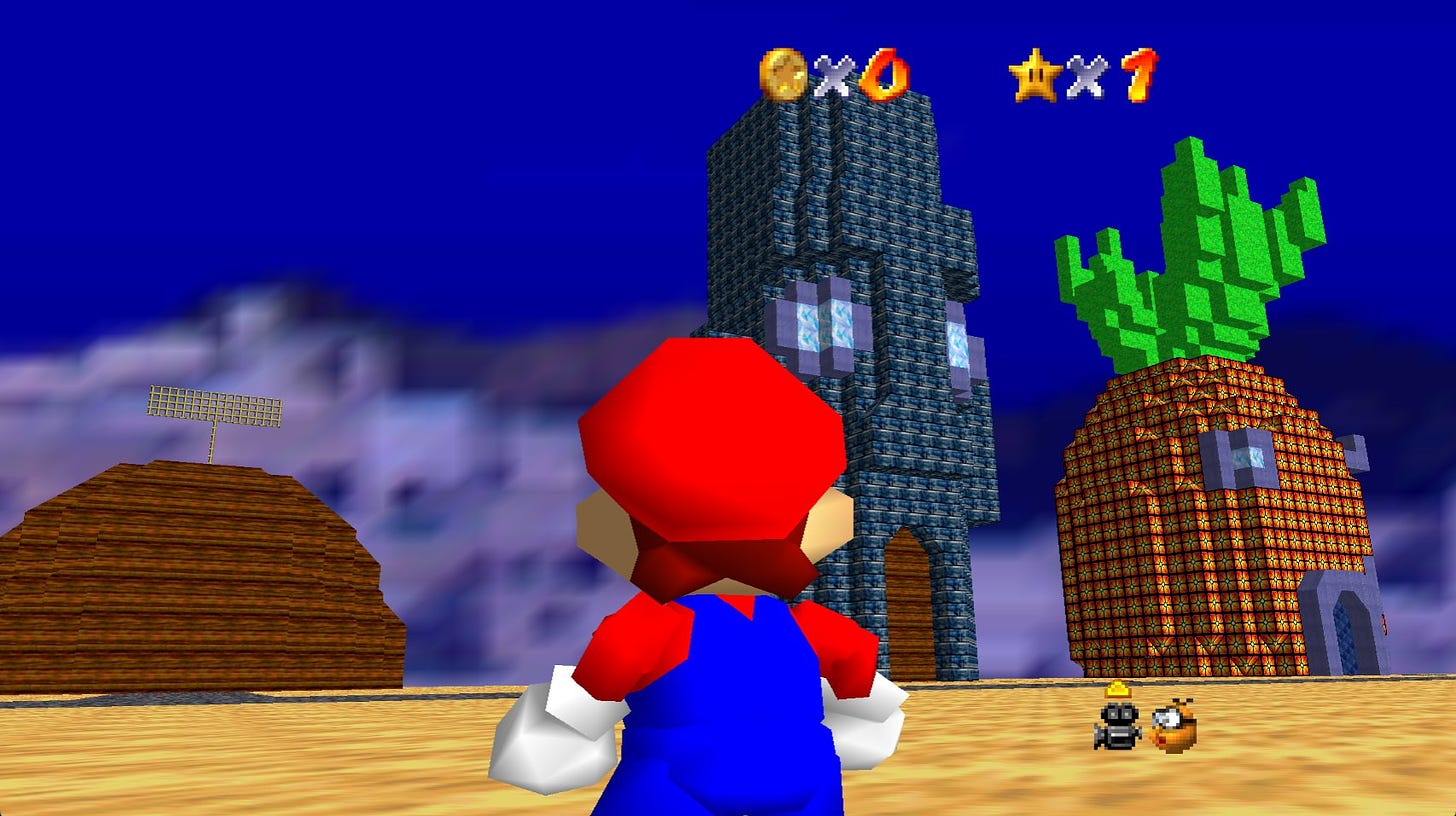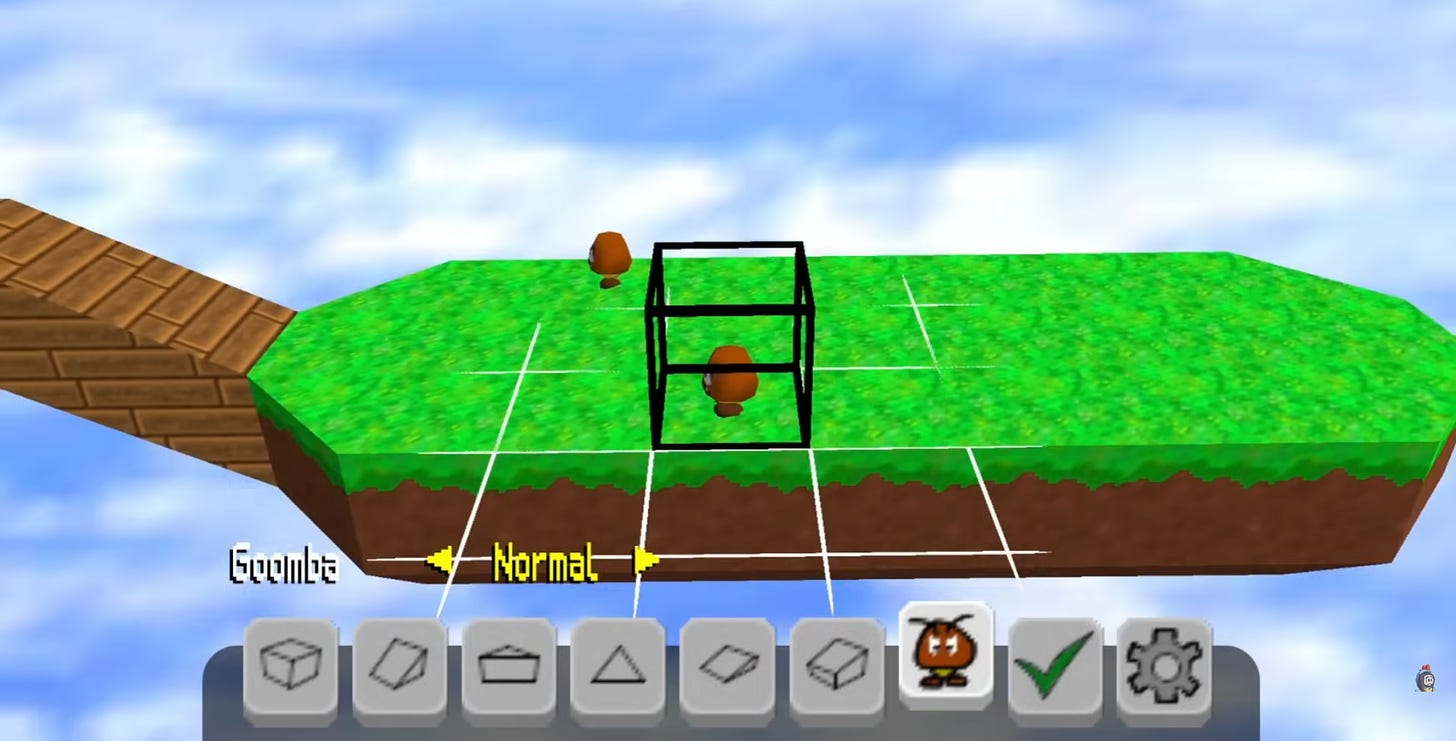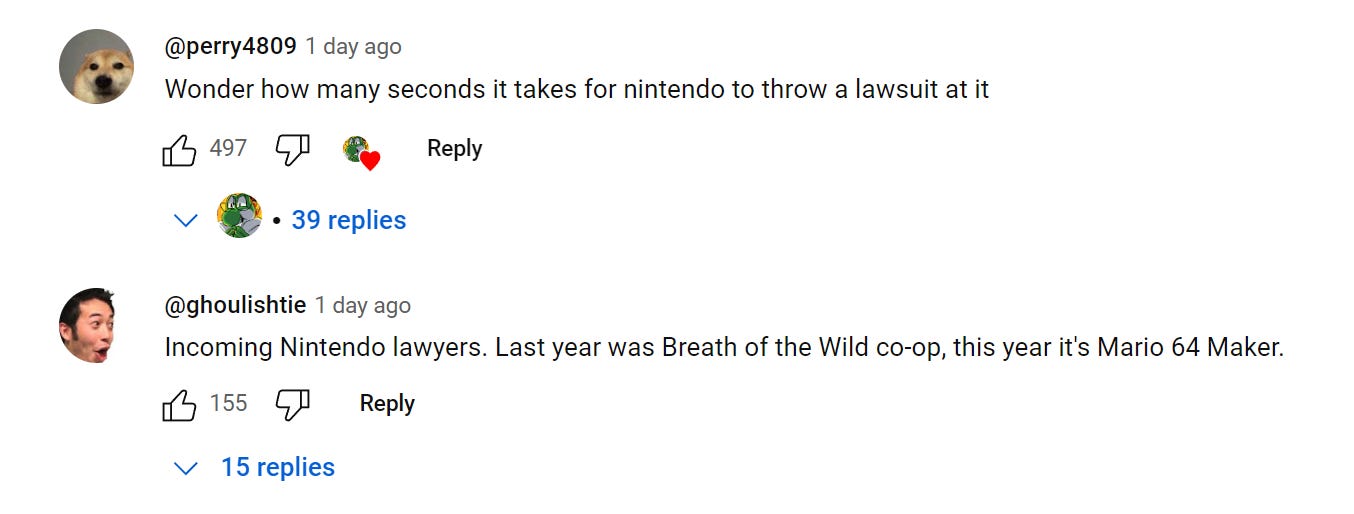Mario Builder 64's Creator Says Nobody Can Stop the ROM Hacking Revolution
push to talk #21 // an interview with the 22-year-old hacker behind a hyper-viral Super Mario 64 ROM hack
May 2024 has been a surprisingly big month for the Nintendo 64.
Just two weeks ago, a small hacker collective revealed a new method of quickly and easily creating native PC ports of N64 games—unlocking insane possibilities like 60fps, ray-tracing support, and other mods for classic games.
Then, earlier this week, a 22-year-old ROM hacker released Mario Builder 64, a free tool that enables anyone in the world to make and share their own Super Mario 64 levels. And it can run on actual N64 hardware.
My interview with Rovertronic is below. But first, this week’s spiciest links.
Scuttlebutt and Slackery
The week’s most-shared, oft-Slacked, and spiciest games industry news links.
Game Recommendation: Arctic Eggs - “How do I know which sock to put on first?” asks a mustachioed NPC in the new, $9.99 release, Arctic Eggs. A woman lurking nearby, her face half-covered by a breathing apparatus, chimes in: “The taste.” The man turns to her and stares. “I don’t know you, do I?” she asks. Then a minigame commences in which you must cook an egg without dropping any cigarettes. 10/10, Push to Talk recommends. (Arctic Eggs on Steam)
Atari Acquires Intellivision - File this one under “headlines that sound like they’re from 1986.” The real story here is that Atari subsidiary Digital Eclipse—which has been producing absolutely insane remakes and “interactive documentaries” about classic games like Llamasoft: The Jeff Minter Story —now has the rights to 200 or so classic Intellivision games. (PC Gamer)
Inside the Peculiar World of Farming Simulator Esports - The best-selling Farming Simulator series has a professional esports scene, it turns out, with prize pools of up to Є200,000. There is a pick/ban phase for tractors before each match begins. There are commenters yelling in German. It has it all. A lovely new half-hour documentary explores this bizarre subculture and makes me wish for competitive farming IRL. (People Make Games)
Helldivers 2 and the Collective Power of Steam Reviews - On April 3rd, Sony announced that fans of the breakout hit Helldivers 2 would need to link an official PlayStation Network account in order to continue playing the game. The only problem? PlayStation Network accounts aren’t available in 177 of the countries in which Helldivers 2 had already launched, meaning the game would become broken for many players around the world. Chaos ensued. Danny O’Dwyer tells the complete tale. (A16Z GAMES)
Mario Builder 64 Creator Says Nobody Can Stop the ROM Hacking Revolution
The first time Rovertronic encountered Super Mario 64, it was through an emulator.
He was only four years old.
“My older brother sat me on the old Windows desktop and had me play it on Project 64,” he says. “The world enamored me, but I never got far in the game.”
For all he knew, this was simply the way you played Nintendo 64 games—on PC, through homebrewed software. Years later, Rovertronic discovered the fledgling SM64 ROM-hacking scene via one of its most impressive achievements, Super Mario Star Road, a fan-made sequel to SM64 built within its original engine.
“I was shocked that this sort of thing was even possible,” he says.
First Steps and Growing Ambitions
By the time Rovertronic was 15, he’d begun downloading ROM hacking tools and experimenting with his own original creations. His first SM64 hack was small—just replacing some of the stained glass in Princess Peach’s castle with a picture of Golden Freddy from Five Nights at Freddy’s. It wasn’t much, but it was a start.
“I ended up figuring things out and making a short-level compilation which was a four-level hack with levels themed around Minecraft, Roblox, an airship, and an ice fortress. Of course, the hack was poorly designed, but I'm still proud of it because it was the first SM64 project I completed.”
Shortly after, the YouTuber SimpleFlips announced a ROM hacking competition.
This, Rovertronic says, is when he first started getting serious about it. This was back before the Super Mario 64 “decomp” project which converted the game’s code from assembly (very difficult to work with) to the more human-friendly C. But Rovertronic forged ahead anyway, learning ASM to the point that he could make “basic custom objects” within the SM64 engine. But it was rough going.
“When I heard about the decomp project, I was incredibly excited,” he says. “Instead of writing binary assembly code, you could write actually readable C code and recompile the project into a ROM without worrying about niche things like not being allowed to use odd floating point registers.”
Rovertronic leapt at the opportunity and released Detective Luigi, one of the first fully-fledged hacks made using the newly-decompiled code.
“Since I had C code, I had the ability to customize absolutely everything,” Rovertronic says. “I didn't make the best design decisions, but just being able to use C code and be able to read everything and modify everything was an incredibly freeing experience.”
A torrent of original hacks followed. A tower defense mod where you fight Thwomps, a mini horror game, and even a Garry’s Mod style hack that allowed players to create new in-world objects on the fly.
The Origins of Mario Builder 64
In 2023, Rovertronic released his biggest hack yet, a full game in the style of Super Mario Star Road called Super Mario 64: Beyond the Cursed Mirror.
It was in the process of building Cursed Mirror that Rovertronic decided to make a custom level editor within the SM64 engine. At some point in the process, he realized that with the right tweaks, he could release the level editor itself and have it work essentially like a real Mario Maker game.
Fellow ROM hacker Arthurtilly joined the project and, says Rovertronic, “he ended up rewriting half the codebase making everything so much more improved. Mario Builder 64 wouldn't be there without Arthurtilly.”
The reaction to the release of Mario Builder 64 earlier this week was an order of magnitude bigger than anything Rovertronic had experienced before: millions of views, tens of thousands of likes and—as of this writing—over 15,000 downloads of the tool itself. Already, hundreds of player-created levels are appearing on level-sharing sites and in the Rovertronic Discord server.

Where it Goes From Here
Rovertronic seems taken aback by the enormous response to the project, although since it’s a free shareware project, the success hasn’t actually been life-changing in any practical sense.
When asked about his future ambitions for game development, Rovertronic says he’s unsure. “Right now I've recently been employed at an IT job, so I no longer have time to sink unreasonable amounts of hours into this hobby I enjoy so much. Making an original game is a salivating prospect, but my main roadblock is figuring out what kind of game I could make that hasn't already been done better elsewhere.”
The risk of investing time into something that’s already been done is real. Under Rovertronic’s post on X teasing the release date of Mario Builder 64, another ROM hacker replied “Well this is awkward…” with a video of his own fully-fledged Super Mario 64 level editing tool. Rovertronic replied encouraging the other dev to continue, given some interesting differences in two projects’ approach, but these sorts of things tend not to be as fun when you’re not the first.
As for the possibility of creating wholly original games, Rovertronic says he worries about the difficulty of making something that would stand out. “I could try make a platformer, but it'd just get lost in the sea of already existing indie 3D platformers,” he says. “It's also a lot harder to market an indie game over a ROM hack. If I made Goofy McGee Builder instead of Mario Builder 64 it would've gotten 7 likes on X instead of 67 thousand likes.”
Of course, as many online commenters have pointed out, there are other risks associated with making things online using Nintendo’s IP, even as shareware.
“With all the media coverage that Mario Builder 64 has received, there's absolutely no chance that Nintendo hasn't heard of the project already,” says Rovertronic. So far, he says, he hasn’t heard anything from Nintendo’s legal team, and he’s hopeful he won’t, as he’s been careful to play by the rules as they’re understood in the ROM hacking world.
“The ROM is distributed as a patch file, which means all the copyrighted content is obfuscated,” he points out. Still, he admits, he’s concerned by the possibility that overly-zealous lawyers might take measures like hitting his YouTube channel with copywright strikes.
But, even if that happens, the ROM hack is already out there. “They can't magically erase Mario Builder 64 from the thousands of hard drives it's got itself on all over the world. Once you put something on the internet, it cannot be deleted, no matter how many digital laws and regulations there may be.”
In the meantime, Rovertronic says, he hopes YouTube commenters find something more interesting to say about the work he’s released: “I'm more bothered by the endless stream of the same original ‘Here come the Nintendo ninjas’ joke repeated thousands of times by annoying people than by Nintendo themselves if they were to actually take action against me.”
That’s it for this week. I’m gonna learn to code in C so I can make a Banjo-Kazooie ROM hack where you play as the guy and the rat from Ratatouille.
See you next Friday.






